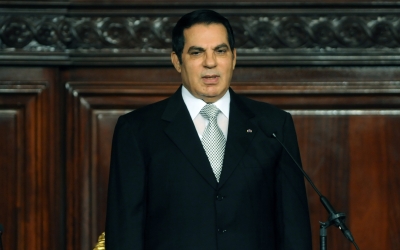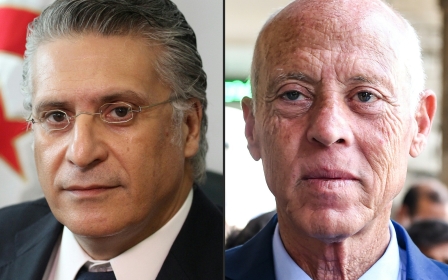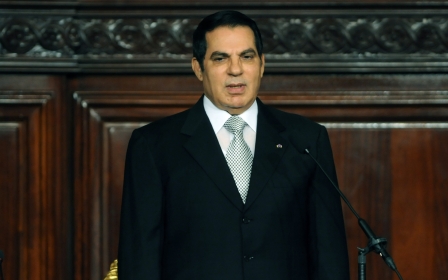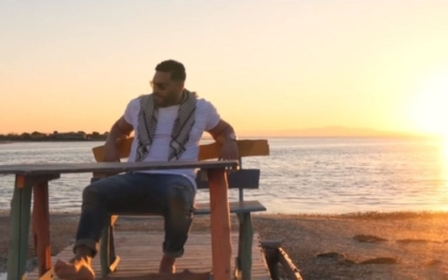Between condolences and 'good riddance,' Tunisians reflect on Ben Ali's death
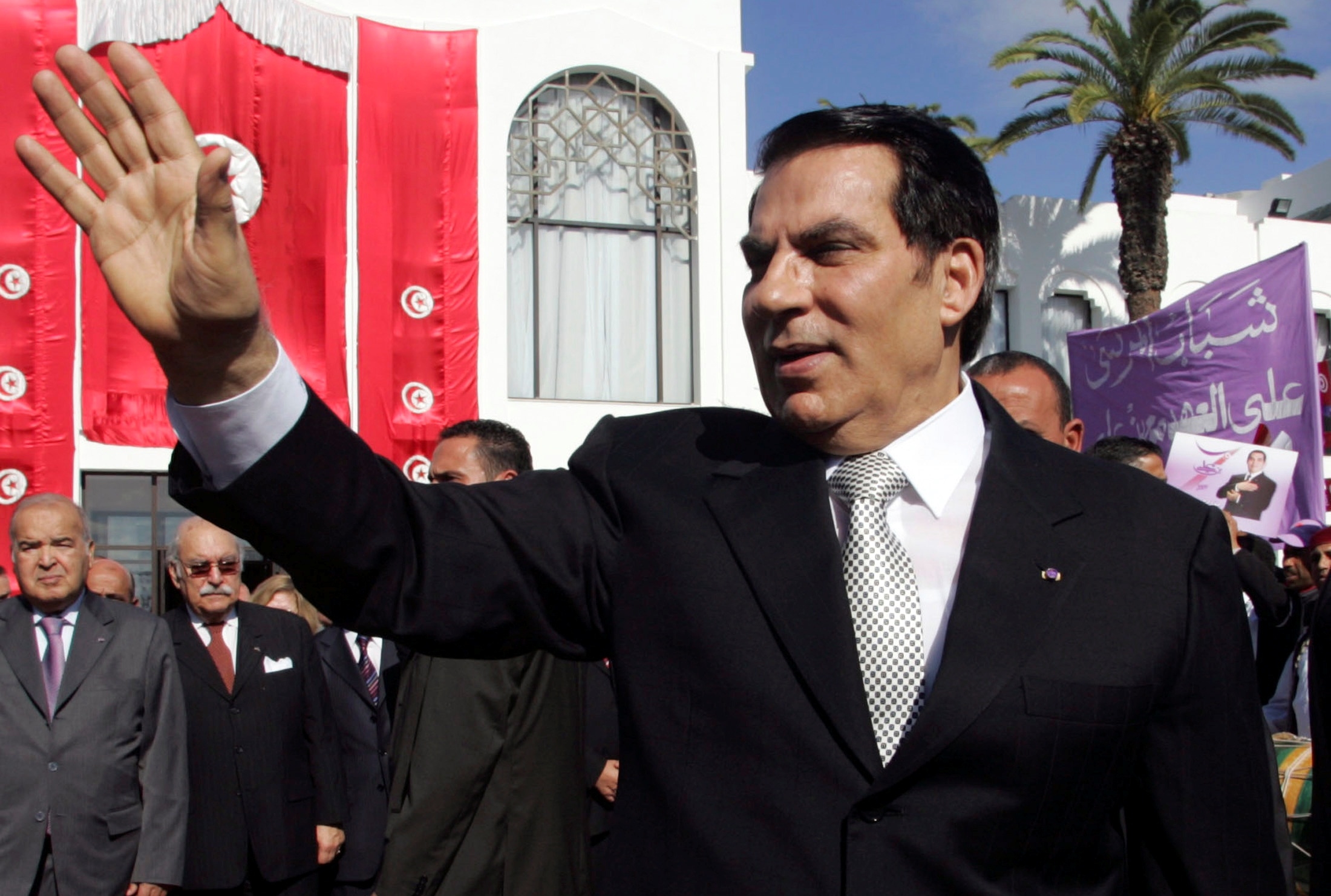
On Thursday, a particular chapter of Tunisian history came to a close with the death of Zine el Abidine Ben Ali, the autocrat who ruled over the country with an iron fist for 24 years, and the first leader to be ousted by mass uprisings known as the Arab Spring.
Eight years after demonstrators poured into the streets of the country calling for Ben Ali's downfall, the news of the 83-year-old's passing has been met with mixed feelings by Tunisians.
New MEE newsletter: Jerusalem Dispatch
Sign up to get the latest insights and analysis on Israel-Palestine, alongside Turkey Unpacked and other MEE newsletters
As Tunisia remains fragile in many ways eight years since he left office, and after a first-round of presidential elections on Sunday has left the country in uncharted territories, some recall with bitterness the toll Ben Ali's repressive policies took on many citizens, while others look back wistfully at what is seen now as simpler times.
'Our president'
"It's the president who died, not Ben Ali," Ahmed Shehil, a 78-year-old retiree, said. “His spirit remains immortal. He was the best, and we will mourn him as we mourned former president Beji Caid Essebsi.”
Essebsi, Tunisia’s first democratically elected president after Ben Ali's ouster, died on 25 July.
While some, like Shehil, expressed condolences for Ben Ali as a former head of state, members of the Free Destourian Party (PDL) - the counter-revolutionary political descendant of Ben Ali's now banned Democratic Constitutional Rally (RCD) party - continue to view Ben Ali as a model leader who should never have been stripped of his power.
"It's our president," PDL Secretary-General Bel Hassan Hajloul, told MEE. "After eight years, his departure from Tunisia is a still-unsolved mystery to us. They ruined the prosperous and flourishing state built by Tunisia's first post-independence president, [Habib] Bourguiba, and Ben Ali."
"Ben Ali changed our lives," Amina Remili, 45, said, as she claimed Ben Ali granted Tunisians "freedom" and "liberated" women.
With legislative elections scheduled for 6 October, the Ben Ali supporter said she planned to vote for PDL leader Abir Moussi, who was placed ninth in the recent presidential polls with four percent of votes, "and take revenge on the forces who put us in this hell".
While his supporters recall him fondly, Tunisia under Ben Ali was consistently ranked poorly by international barometers of human rights, democracy and press freedoms.
The country's economy thrived under certain metrics under his rule, but the country's youth, particularly in impoverished and rural areas, struggled with high unemployment.
The self-immolation of street vendor Mohamed Bouazizi in December 2010 over economic hardships was the event that sparked the revolt against Ben Ali's authoritarian rule and inspired other popular movements across the region and the world.
'Time to move forward'
For other Tunisians, there was no love lost upon learning of Ben Ali's death in Saudi Arabia, where he and his family had lived in exile since 2011.
For Dalila Rjeb, a director in the private sector, "Ben Ali ensured our safety but deprived us of our freedom".
"We will never regret his overthrow in 2011. He is as dead as our children from Sidi Bouzid," she added, referring to the town where the uprising began. "Let us rather honour the victims who died in the revolution."
Yasser Jradi, a Tunisian musician known for having written a hymn of the 2011 revolution, struck a conciliatory tone.
"May he rest in peace first," he told MEE. "Despite the fact that we fought against his regime of dictatorship and corruption, today it is a question of humanity to respect death."
"I've always been told that Ben Ali was a dictator," 20-year-old student Mouna Agili said. "I hope his death marks the end of torture and corruption. That's all that matters."
For Sihem Ben Sendrine, head of the Truth and Dignity Commission (IVD) - the organisation leading fragile efforts at accountability for crimes committed by the state under Ben Ali and his predecessor, Bourguiba - his death, like his departure, does not mean the end of the legacy his rule left behind.
"I am not interested in Ben Ali as a person, but in what he represents. His regime still exerts a massive influence on our present-day society," said Ben Sendrine, highlighting the lack of effort to secure assets he misappropriated.
"Up to now, there was no political will to undo the country from his legacy, but this could change with the next government."
Since Ben Ali's fall, the country has struggled with economic and security issues that have left many Tunisians disillusioned with the aftermath of the revolution.
"I feel disappointed," 48-year-old taxi driver Amar Mhadi said. "Nowadays, we can't work in full safety, and there are no tourists, too.
"I hope we will get a copy of Ben Ali. Honestly, I like him. Back then, we had a thief in office, now we have Islamic State terrorists and thieves."
For others, Ben Ali's death was a sign that Tunisia needs to focus on the future - as a second round in presidential elections will have the public choose between two political outsiders.
"Ben Ali is someone from the past. It's time to move forward," Ahmed Benz, a 38- year-old history teacher, said.
Middle East Eye delivers independent and unrivalled coverage and analysis of the Middle East, North Africa and beyond. To learn more about republishing this content and the associated fees, please fill out this form. More about MEE can be found here.


